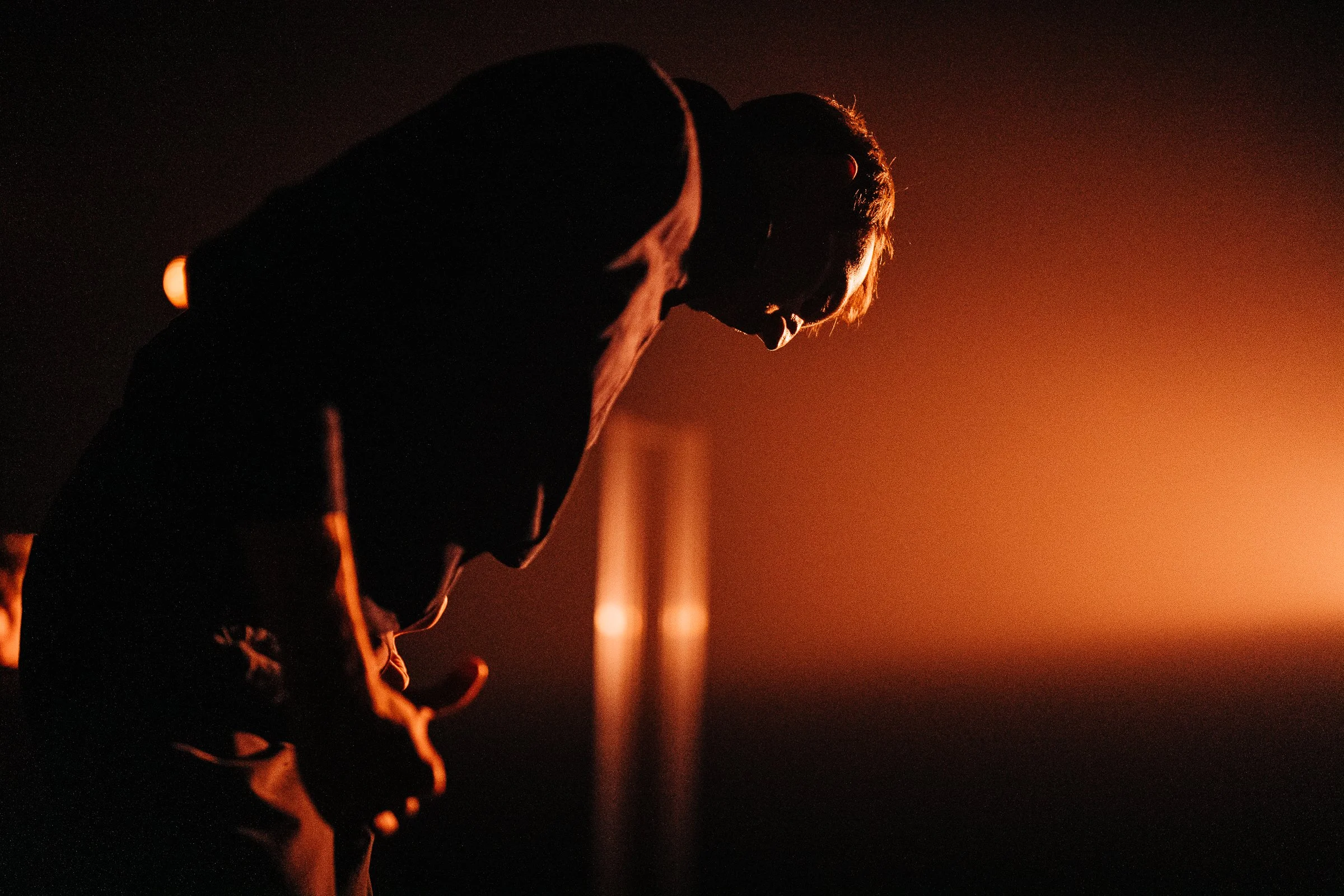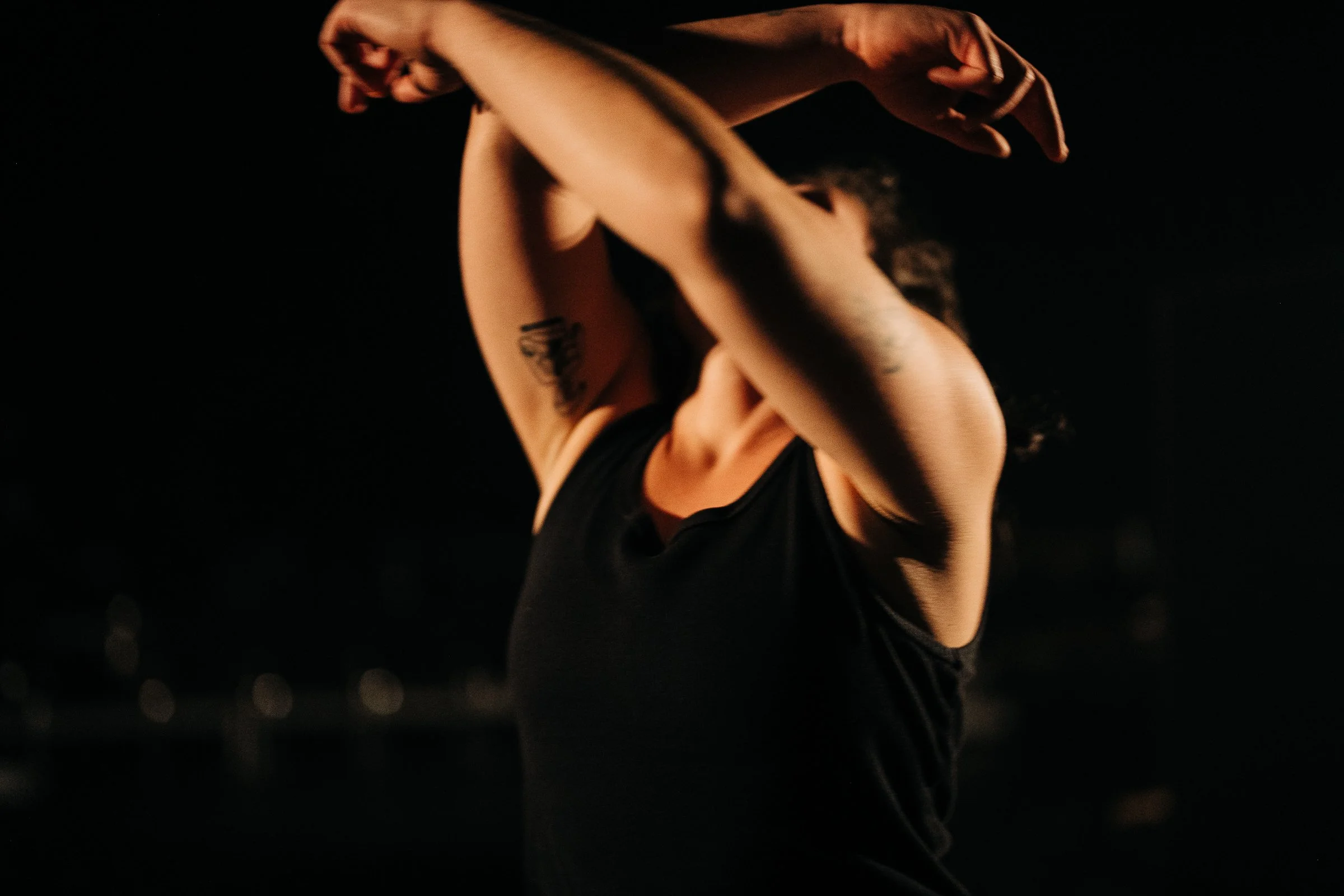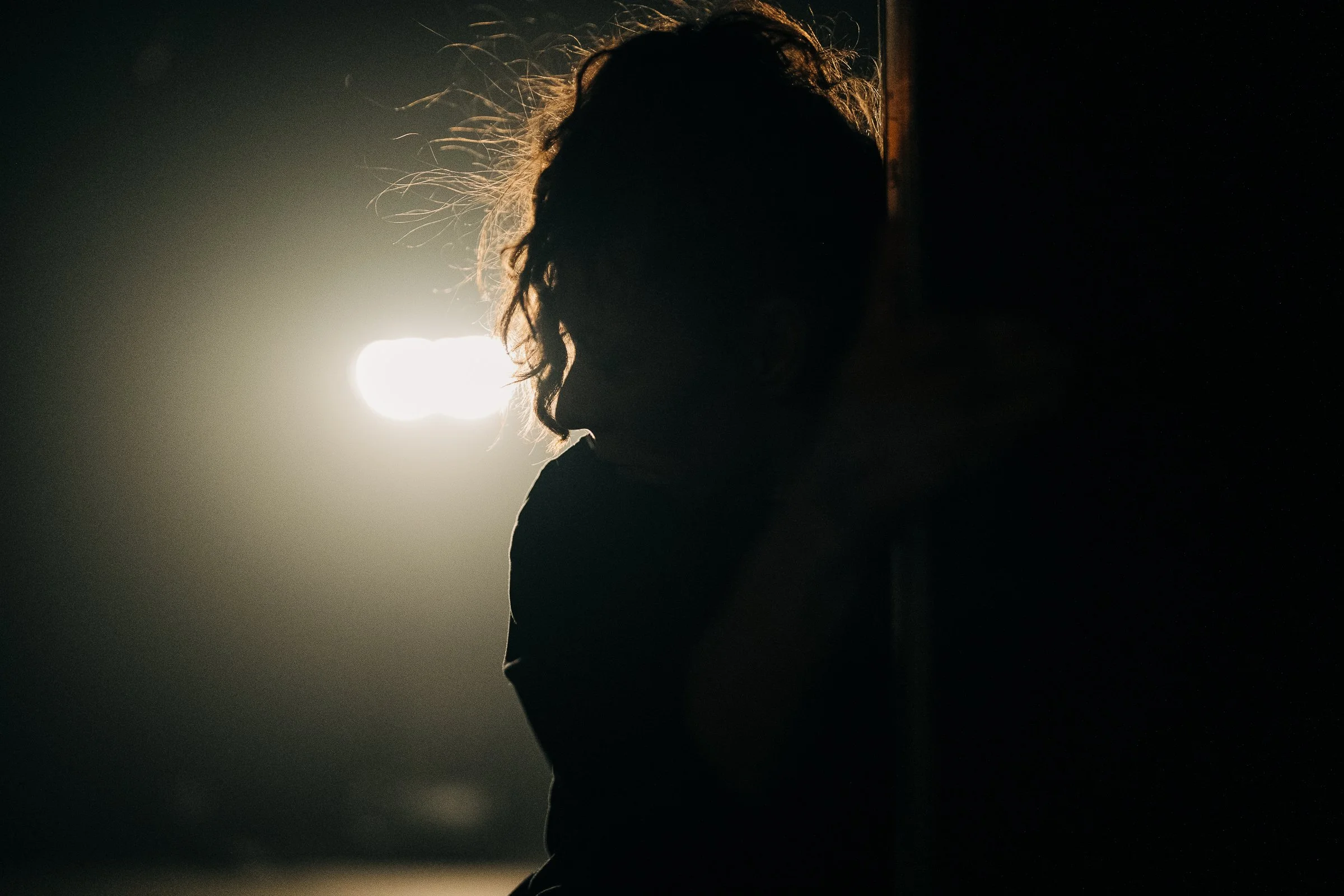Because You Never Asked - Archiving and Performing Memory
Photo by Do Phan Hoi
Pictured: David Albert Toth
I arrive late to Else’s, and my subject is waiting patiently. We hug, we sit, I order a cidre and we spend a few minutes catching up.
I met Roger White in 2016, along with his wife, Helen Simard, at a Montreal Fringe Festival event. I was immediately drawn to the collaborative nature of their relationship, as well as the interdisciplinality of their work. At this time, the couple were taking their piece No Fun to Toronto. Helen’s choreography and Roger’s music created one of the most visceral, electric performances I’d ever witnessed. Over the next few years, I had the pleasure of seeing them do it again, and again, and again. And between these bangers, Helen and I could be found moshing at one of Dead Messenger’s shows, with Roger on lead guitar and vocals.
At the outset of the pandemic there were some amazing things happening in the arts community in Montreal. Online script workshops, classes, performances, these helped many of us get through those first uncertain months. During this time, Roger found himself as part of the Segal Centre’s Jewish Mentorship Program.
“Helen encouraged me to go for that, and part of me wasn’t sure. I wasn’t raised Jewish, I have no cultural connections really, and I wasn’t even sure if I could do it. But I put the application in, got accepted, and that kicked my ass to start putting this together.”
What is this, though? Because You Never Asked is a dreamlike interdisciplinary work where historical fact meets auto-fictional storytelling in a multilayered, intergenerational experience. It is based on discussions with his grandmother about her experience of fleeing Nazi Germany and premieres April 19, 2023. While I’ve yet to see the show as it will premiere in April, I did have the pleasure of being involved with the project at an early stage, and I’ve been privy to some of the evolution of this powerful piece.
“It didn’t start as an art project, it started as an archival thing. My grandmother grew up in a mixed Christian-Jewish family in Hamburg, Germany in the 1930’s. They lived through the Nazis until ‘39, until they couldn’t stay anymore.
“There’s a saying amongst Jewish people: ‘the pessimists left and the optimists stayed behind’. My grandmother put it all behind her, though. Including the Jewish side. She moved to the UK, she started a family, she put it all behind her. She didn’t transfer any of the knowledge. I grew up roughly knowing, I knew we had this Jewish thread through our family, but I was young and never really thought, ‘Oh that’s why you’re in England’. So we never, as a family, spoke about it.”
At some point, things changed. During a visit to Canada in the 2000’s, Roger’s grandmother began to share bits of information, anecdotes. “One time she was over, and it was the anniversary of Kristallnacht, and she said out of nowhere, “oh that day my father was learning how to drive so we could get out. He didn’t know how to drive. He was in a shopping centre parking lot and was practicing reversing and nearly hit someone. If he had done that, none of you would be here.”
A single moment his grandmother recalled that would have changed the entire course of the family’s history. After this, more information would surface infrequently, and Roger took notice. Was this intentional, was it due to age?
“Probably both. It started with asking questions, I hadn’t had access to any of the material at this time. It was mostly just my aunt and I asking questions.” But the way his grandmother answered these questions, told stories, caught Roger’s attention. “The oddest thing was that the way she talked about it didn’t seem like a trauma response. It just seemed like she just never got around to talking about it. Some of it is pretty traumatic, but she spoke about it so matter of factly, like it had happened to someone else. She knew all about it, but hadn’t experienced it herself.”
“I’m not a historian, I’m an artist. I haven’t talked to a bunch of people in this situation, it’s really only the one. But I would imagine that most people would be really traumatized by this.
"My great grandmother, her mother, died when I was 11. I knew her in my childhood. My grandmother was 16 or 17 when she left Germany and my great grandmother was about my age. She was a very traumatized person. In her later years, she suffered from dementia. Often what happens, with dementia, you get stuck in a certain period, a place in your life, and she was stuck there.”
Same family, same experiences, different outcomes. I wonder about the stark contrast. Roger has a theory. “I think her family did a lot of work to keep her sheltered, really.”
Photo by Do Phan Hoi
Pictured: Marie Lévêque
With the openness of his grandmother to answer questions, Roger began to dig deeper, to ask specific and intentional questions, but was often met with the response, “Oh, I don’t remember much…”
“Until my aunt and I eventually discovered that she’d kept loads of letters and diaries. At some point she had the foresight to realize this is important and should be kept. But by the time she was 90, she’d forgotten she kept it. And she also had things of my great-grandmother’s that she kept. Letters, diaries, all kinds of stuff that then gives you an insight… so me talking to her as a 90 year old, end of life, comfortable, she eventually became an open book. She would talk about experiences, friends, family, people that she slept with, no inhibitions.”
Of course, I’m curious about the moment this changed from a story Roger was being told, to a story he needed to tell.
“Around 2015-2016, my aunt started to scan things and send them to me. Mind blowing thing after mind blowing thing. I started to realize I could do something with this. The inflection point for me was that I went to a show at the MAI, as part of Fringe. It was this American show featuring Merce Cunningham’s archivist, and a dancer that took care of him as he was dying. The archivist had been with Merce since they started the company, and was himself, like, 90 years old. They did this show where it was just the two of them, the dancer and the old man, the archivist, talking about life and the beginning of the company, and then talking about the last tour. I think it was around the time of seeing that Fringe show. I had an interest in documenting the story. I’ve had people ask, ‘why don’t you write a book?’ I’m not a writer, for one. But I’m also an egomaniac I suppose, and while I want that story to be heard, I want to be there, I want that… immediate gratification. Even in my music, I’d rather have a captive audience than to just release a recording. I’ve also been asked why this isn’t in a gallery as an installation. It’s the same thing, it’s an exhibition. I’d rather have that captive audience.”
Engagement over exhibition. We pause for a moment to order another round, and I take the opportunity to learn more about the structure of the Jewish Mentorship Program.
“You’d have sessions with someone who works in theatre, Caitlin Murphy. She would push you on the story side. And there was another woman, Sivan Slapak, and she would deal with the more cultural aspect. That was really interesting. You’d meet with other artists, in the Jewish community, contemporary Jewish artists. And as someone who wasn’t raised culturally Jewish, I wondered if I had a right to tell this story. That was something that I got from that program, the answer, ‘Yes, I absolutely can tell this story.’ It’s not just someone else’s story, it’s my story, too. And the program really helped me understand the Jewish aspect of the story. Sure, I talk about Nazism, but there are other elements to it that are deeply Jewish, stuff that goes back thousands of years, like the concept of displacement. That’s one of the oldest Jewish threads, right? Perpetual displacement. That’s an inherent part of my family’s story. That’s why my grandmother ended up in England, her brother wound up in Switzerland, her other brother ended up in the States.”
Not long after Roger’s experience at the Segal Centre, I took part in a script workshop for what was an early version of Because You Never Asked. Though it appeared, at that stage, to be a beautifully written play, the storytelling itself was in its infancy. This became apparent when Roger released a video at the end of the Jewish Mentorship Program, in lieu of a public performance. This video was mostly auditory, with his grandmother’s voice over his haunting soundscapes.
Artistic process mixed with a personal journey.
“We All Fall Down, Helen and I, our process is very abstract. But when you’re trying to tell a linear story, it’ll mess with the abstract. And then you’re going to have the audience trying to figure out timelines. Also, I’m really dealing with a specific six to eight year period of a person’s life who lived to be 90.
“I had two lines, two story arcs. The scripted one and the recorded one, the conversations between myself and my grandmother. I figured out how to wrap THAT story up, but I couldn’t figure out how to wrap the story in the script.
And another thing was realizing how important hearing my grandmother’s voice is to this work. I was getting to the point where I had the script, I had her voice, and I was going to have to start making more compromises on her voice for the script. Then I came to the realization that it’s not a play. It’s an interdisciplinary work, and the interviews and the relationship between us, that’s what was important. There is a scripted element to the show, but it’s in service to the abstract. It’s highlighting the process itself, really. What it’s like to open up a box and find all this material and start reading through it and thinking ‘Oh my God!’ Every letter you pick up and read is horrific, or at the very least overwhelming.”
Halfway through the second round, as we discuss the process, Roger’s eyes light up. He begins to discuss The Princess Bride.
“You know The Princess Bride? So that movie, and I’m not talking about the book, I’m talking about the movie. On paper it’s a tale about a swashbuckling pirate trying to save his girlfriend from a marriage she doesn’t want, which is the context. The subtext of the film is about a grandson who is home sick from school with his estranged grandfather, because his mom had to go to work. The grandfather is going to read him a story. At first, the kid is hesitant with the grandfather, but by the end of the movie, the relationship has cemented, they’ve really bonded.
“Yes on paper, Because You Never Asked is about Nazism, but it’s more about an intergenerational exchange, bonding over this family history.
“I’ll generalize a bit here, but when you’re a kid, the relationship with your grandparents is entirely about you. They’re there to see you, and you’re there to have praise thrown on you, to be given attention. What I thought at the end of the day was that I was doing this important work trying to document my family history, but that wasn’t important to her. She was just happy that I was at her house talking to her. We could have been talking about favorite kinds of beer or cidre, we could have been talking about anything, and she would have been stoked. That's what she was getting out of it.
“So really all I'm trying to do is tell a story. What I hope happens is that it encourages you to want to learn more about a parent, a grandparent. Everyone is walking around with at least one crazy story. What happens if you take the time to stop, sit down, and talk about it, ask about it?”
I’m lost in my own thoughts at this point. I’m considering the unknown (at least to me) stories of my own parents, my grandparents. We discuss the idea of stories untold, of someone telling, at 90 years old, a story from their 20’s. The vastly different perspective of age ultimately changes how these stories are told. 70 years can completely alter our memories, but they’re still our memories, our truth. Everything falls into place as Roger explains more of the movement within the piece.
“Movement was always going to be a part of it, because of the nature of our work. Helen is the choreographer of the piece, and I’m stoked to be working with this group of dancers (Brianna Lombardo, David Albert Toth, Maxine Segalowitz and Marie Lévêque). They’ve really embraced the abstraction we work with, especially regarding memory. I always wanted to play with the concept of memory. I didn't want the piece to be just a thing you’re watching. I want it to be like you’re in someone’s memory. That's what I want the audience to feel.
“I thought that given the nature of the soundscape, it’s sort of in the air, it’s higher up rather than on the floor, and what you’re seeing, the bodies in the space, they’re fragments of memory.
Photo by Do Phan Hoi
Pictured: Brianna Lombardo
“A while ago, I was reading a lot of Haruki Murakami, and he talks about memories that are so nuanced that putting them into words wouldn’t do them justice. To me, that’s what the bodies in the space are doing.”
We finish our drinks and I realize I haven’t asked him about the lighting of the piece. While an integral aspect of staged performance, I’ve yet to see a We All Fall Down production without the lighting used as a powerful storytelling force in itself.
“The lighting is really important in the show, as well. Our lighting designer, Tiffanie, is amazing. I sat down, I talked to her about it, and later when she showed me what she’d done… She got it, she got it right away. She nailed it. The movement is there to support the audio and the lights really complete the picture.
“There's a certain amount of hypnosis I'm reaching for because you’re really asking the audience to detach what they’re seeing from what they’re hearing. All that to say, as the person who created the show, if the audience detaches, maybe they just watch the dancing but don’t listen to the audio, or you just listen to the audio, or you’re just watching the lights, whatever. That’s fine. I’m into that.”
Because You Never Asked opens April 19th, 2023 - TICKETS AVAILABLE NOW
Visit We All Fall Down Creations for more information on Roger White and Helen Simard
Catch Dead Messenger on March 17th at Turbo Haus!



